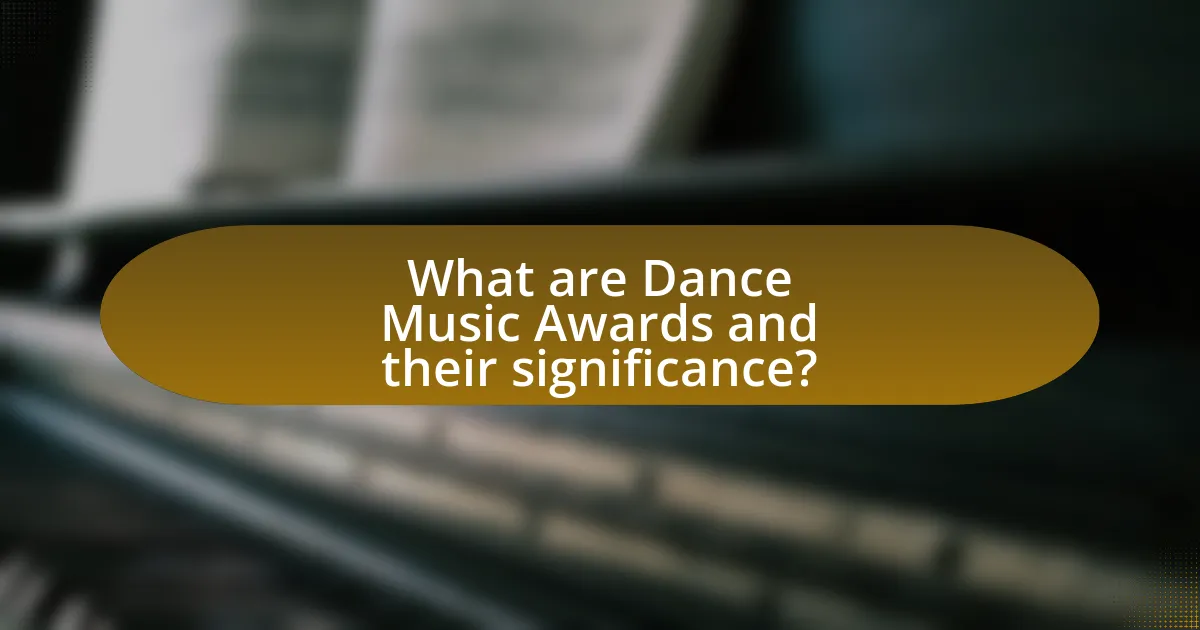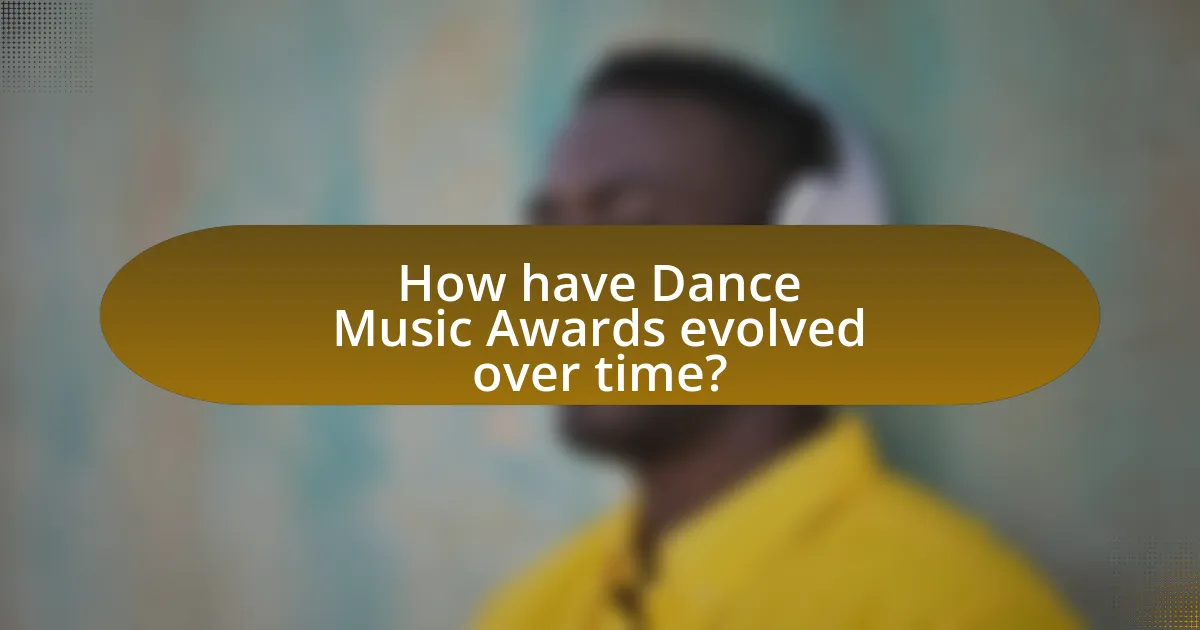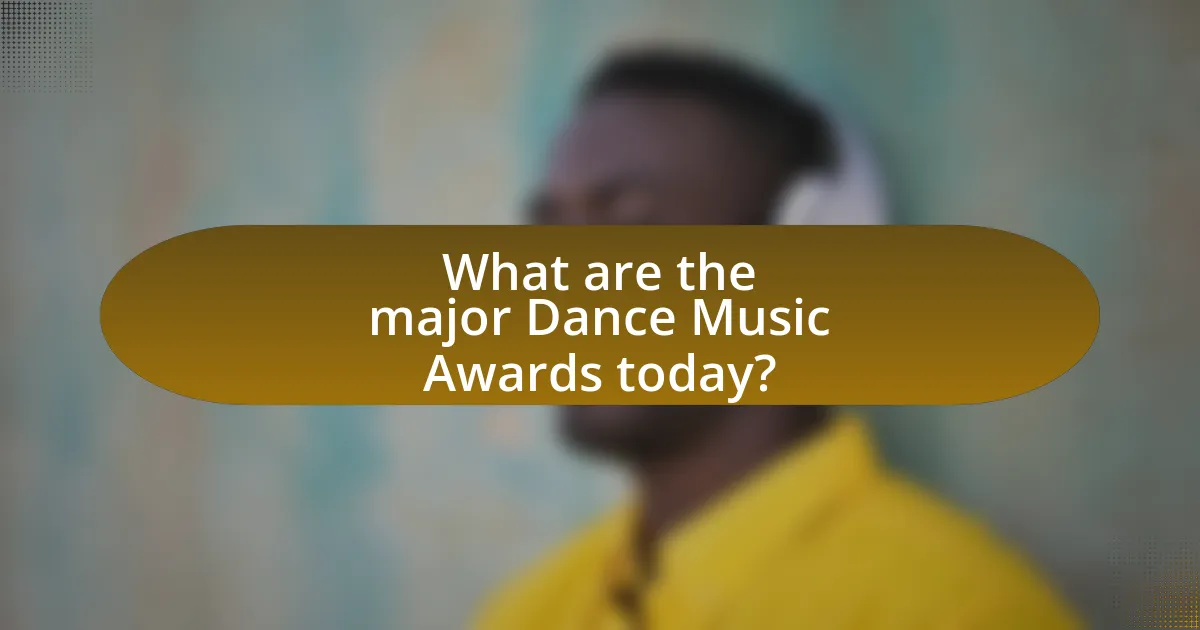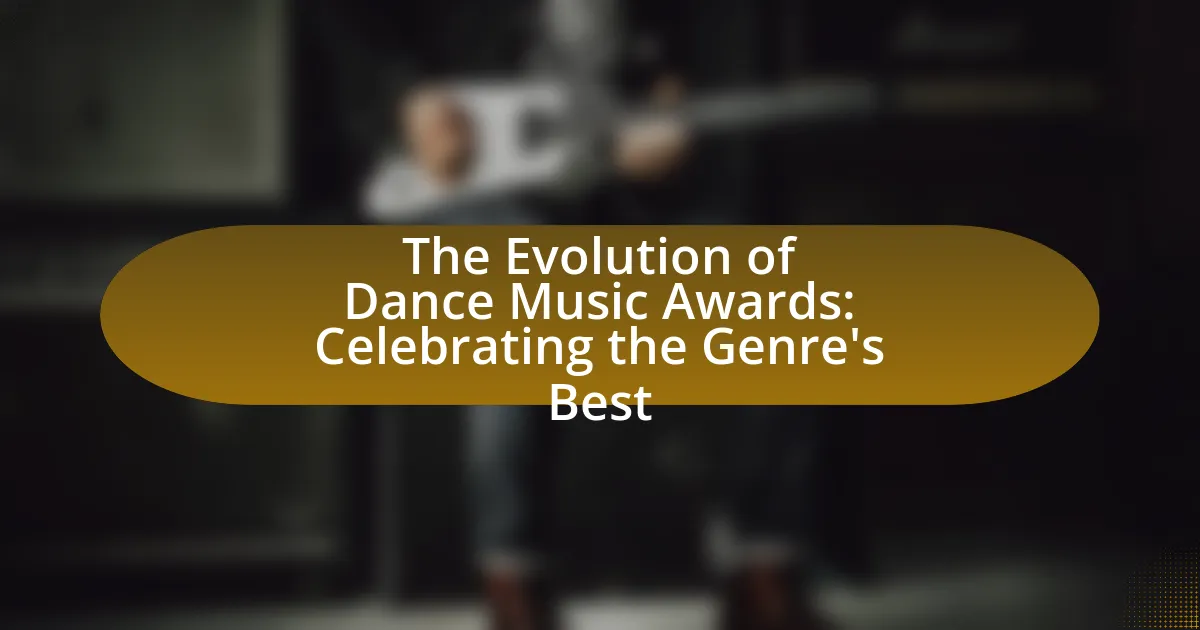Dance Music Awards are recognition events that honor significant achievements in the dance music genre, celebrating artists, producers, and tracks that contribute to the industry. Originating in the late 1990s, these awards have evolved to reflect the genre’s diversity and cultural impact, with categories expanding to include various sub-genres and fan-voted awards. The article explores the historical context of these awards, their significance in promoting dance music, the evolution of voting processes, and the major awards today, highlighting their role in supporting emerging talent and engaging with fans. Additionally, it discusses best practices for artists to prepare for and promote their nominations effectively.

What are Dance Music Awards and their significance?
Dance Music Awards are recognition events that honor outstanding achievements in the dance music genre, celebrating artists, producers, and tracks that have made significant contributions to the industry. Their significance lies in promoting the dance music culture, providing a platform for emerging talent, and acknowledging the hard work of established artists, thereby fostering community and innovation within the genre. For instance, awards like the DJ Mag Top 100 DJs poll not only highlight popular figures but also influence trends and inspire new artists in the dance music scene.
How did Dance Music Awards originate?
Dance Music Awards originated as a recognition platform for outstanding achievements in the dance music genre. Established in the late 1990s, the awards aimed to celebrate and honor artists, producers, and DJs who significantly contributed to the evolution of dance music. The inception of these awards was driven by the growing popularity of electronic dance music and the need to acknowledge its impact on the music industry.
What historical events influenced the creation of Dance Music Awards?
The creation of Dance Music Awards was influenced by the rise of electronic dance music (EDM) in the late 20th century, particularly during the 1980s and 1990s. This period saw the emergence of genres such as house, techno, and trance, which gained significant popularity in clubs and festivals worldwide. The establishment of major music festivals like the Love Parade in Berlin and the emergence of influential DJs and producers contributed to the recognition of dance music as a legitimate genre deserving of awards. Additionally, the growth of the internet and digital music distribution in the 2000s facilitated wider access to dance music, further solidifying its cultural impact and the need for an awards platform to celebrate its achievements.
Who were the pioneers behind the first Dance Music Awards?
The pioneers behind the first Dance Music Awards were DJ Mag and its founder, Martin Carthy. DJ Mag initiated the awards in 1998 to recognize and celebrate achievements in the dance music genre. This event marked a significant moment in the music industry, as it provided a platform for artists and DJs to gain recognition for their contributions to dance music.
Why are Dance Music Awards important for the genre?
Dance Music Awards are important for the genre because they recognize and celebrate the achievements of artists, producers, and tracks within the dance music community. These awards provide a platform for visibility, helping to elevate the profiles of both established and emerging talents. By honoring excellence in various categories, such as Best DJ, Best Track, and Best Festival, the awards foster competition and innovation, driving the genre forward. Historical examples include the International Dance Music Awards, which have been held annually since 1986, showcasing the evolution and impact of dance music on global culture.
How do Dance Music Awards impact artists’ careers?
Dance Music Awards significantly enhance artists’ careers by providing recognition and visibility within the industry. Winning or being nominated for such awards can lead to increased media exposure, which often translates into higher streaming numbers and sales. For instance, a study by the International Federation of the Phonographic Industry found that award-winning artists experience a 30% increase in album sales post-award recognition. Additionally, these accolades can open doors to lucrative performance opportunities and collaborations, further solidifying an artist’s reputation and marketability in the competitive dance music landscape.
What role do Dance Music Awards play in promoting the genre?
Dance Music Awards play a crucial role in promoting the genre by recognizing and celebrating the achievements of artists, producers, and tracks within the dance music community. These awards create visibility for the genre, attracting new listeners and fans through media coverage and public interest. For instance, events like the International Dance Music Awards have historically highlighted influential artists and trends, contributing to the growth of the genre by fostering a sense of community and encouraging innovation. This recognition not only boosts the careers of individual artists but also elevates the overall status of dance music in the broader music industry.

How have Dance Music Awards evolved over time?
Dance Music Awards have evolved significantly since their inception, reflecting changes in the genre and its audience. Initially, these awards focused primarily on recognizing DJs and producers, but over time, they expanded to include categories for various sub-genres, live performances, and even fan-voted awards, showcasing the growing diversity within dance music. For instance, the introduction of categories for electronic music festivals and collaborations highlights the industry’s evolution and the increasing importance of live experiences. Additionally, the rise of digital platforms and social media has transformed the voting process, allowing for greater fan engagement and participation, which has become a hallmark of contemporary awards. This evolution illustrates the dynamic nature of dance music and its community, adapting to trends and technological advancements while celebrating its best talents.
What changes have occurred in the voting process for Dance Music Awards?
The voting process for the Dance Music Awards has transitioned to a more transparent and inclusive system. Previously, the voting was primarily conducted by a select panel of industry experts, but recent changes have allowed for public voting, enabling fans to participate directly in the selection of nominees and winners. This shift aims to enhance engagement and reflect the preferences of the broader dance music community, thereby increasing the legitimacy and relevance of the awards.
How has technology influenced the voting and nomination process?
Technology has significantly influenced the voting and nomination process by enabling online voting platforms and real-time data analytics. These advancements allow for greater accessibility, as voters can participate from anywhere, increasing engagement and turnout. For instance, the introduction of mobile apps and social media integration has streamlined the nomination process, allowing fans to nominate their favorite artists easily. Additionally, data analytics tools provide organizers with insights into voting trends and demographics, enhancing the overall efficiency and transparency of the process.
What are the criteria for nominations in recent years?
The criteria for nominations in recent years for dance music awards typically include artistic merit, innovation, and impact on the genre. Specifically, nominees are often evaluated based on their musical composition, production quality, and popularity within the dance music community, as evidenced by chart performance and audience engagement metrics. Additionally, contributions to the genre, such as collaborations and influence on emerging artists, are considered essential factors in the nomination process.
How have the categories of Dance Music Awards expanded?
The categories of Dance Music Awards have expanded significantly to encompass a broader range of genres and sub-genres within electronic music. Initially focused on mainstream styles like house and techno, the awards now include categories for emerging genres such as future bass, trap, and deep house, reflecting the evolving landscape of dance music. This expansion is evidenced by the inclusion of awards for best DJ, best live act, and best music video, which recognize diverse contributions to the genre. Additionally, the introduction of fan-voted categories has increased engagement and representation, allowing for a wider array of artists to be acknowledged.
What new genres or styles have been recognized in recent awards?
Recent awards have recognized genres such as Afro House and Melodic Techno as emerging styles within the dance music scene. The inclusion of these genres reflects a growing appreciation for diverse sounds and cultural influences in electronic music. For instance, the International Dance Music Awards in 2023 featured categories specifically for Afro House, highlighting its rising popularity and influence in global dance music.
How do categories reflect current trends in dance music?
Categories in dance music reflect current trends by organizing the genre into distinct styles that highlight popular sounds and emerging subgenres. For instance, the rise of genres like deep house and future bass in recent years has led to the creation of specific award categories that recognize these styles, indicating their growing influence in the music scene. Additionally, the inclusion of categories for collaborations and remixes showcases the trend towards cross-genre experimentation and the importance of community in dance music production. This categorization not only helps in identifying and promoting new talent but also mirrors listener preferences and industry shifts, as evidenced by the increasing number of nominations for tracks that blend traditional dance elements with pop and hip-hop influences.

What are the major Dance Music Awards today?
The major Dance Music Awards today include the DJ Awards, the International Dance Music Awards (IDMAs), and the Electronic Music Awards (EMAs). The DJ Awards, established in 1998, recognize the best DJs and electronic music artists across various genres. The IDMAs, held annually during the Winter Music Conference, honor outstanding achievements in electronic dance music since 1985. The EMAs, launched in 2017, aim to celebrate the electronic music scene and its artists. These awards are significant as they reflect the evolving landscape of dance music and its global impact.
Which awards are considered the most prestigious in the dance music scene?
The most prestigious awards in the dance music scene include the Grammy Awards, the International Dance Music Awards (IDMAs), and the DJ Mag Top 100 DJs Awards. The Grammy Awards, established in 1959, recognize outstanding achievements in the music industry, including categories specifically for electronic and dance music. The IDMAs, held annually since 1986, honor the best in dance music across various categories, voted on by fans and industry professionals. The DJ Mag Top 100 DJs Awards, initiated in 1997, ranks the world’s top DJs based on public votes, making it a significant indicator of popularity and influence in the dance music community.
What distinguishes these awards from others in the music industry?
These awards are distinguished from others in the music industry by their exclusive focus on the dance music genre, recognizing both established and emerging artists within this specific field. Unlike broader music awards that encompass various genres, these awards celebrate the unique contributions and innovations in dance music, highlighting its cultural impact and evolution. For instance, they often feature categories that reflect the diverse sub-genres of dance music, such as house, techno, and trance, which are not typically represented in mainstream awards. This targeted approach allows for a more nuanced appreciation of the genre and its artists, fostering a dedicated community around dance music.
How do these awards celebrate diversity within the genre?
These awards celebrate diversity within the genre by recognizing and honoring artists from various backgrounds, cultures, and styles. By including categories that specifically highlight underrepresented groups, such as women, LGBTQ+ artists, and artists of color, the awards promote inclusivity and representation in dance music. For instance, the introduction of awards for Best Female Artist and Best LGBTQ+ Track directly acknowledges the contributions of these communities, fostering a more equitable environment in the industry. This approach not only validates diverse voices but also encourages a broader range of musical expressions, ultimately enriching the genre as a whole.
What are the key features of the most popular Dance Music Awards?
The key features of the most popular Dance Music Awards include public voting, industry recognition, and diverse category representation. Public voting allows fans to participate in the selection process, enhancing engagement and ensuring that winners reflect popular opinion. Industry recognition is crucial, as awards are often presented by notable figures in the music industry, lending credibility and prestige to the accolades. Additionally, diverse category representation ensures that various sub-genres of dance music, such as house, techno, and trance, are acknowledged, promoting inclusivity within the genre. These features collectively contribute to the awards’ significance and popularity among artists and fans alike.
How do these awards engage with fans and the public?
Dance music awards engage with fans and the public through interactive voting systems and social media campaigns. These awards often allow fans to vote for their favorite artists and tracks, creating a sense of participation and investment in the outcome. For example, platforms like the DJ Mag Top 100 DJs poll enable fans to directly influence rankings, fostering community involvement. Additionally, awards ceremonies frequently utilize social media to promote nominees and winners, encouraging fans to share their support and experiences, which amplifies public engagement and visibility.
What initiatives do these awards take to support emerging artists?
These awards implement several initiatives to support emerging artists, including mentorship programs, financial grants, and performance opportunities. Mentorship programs connect established artists with newcomers, providing guidance and industry insights. Financial grants assist with production costs, enabling artists to create and promote their work. Additionally, performance opportunities at award events allow emerging artists to showcase their talent to a wider audience, enhancing their visibility in the industry.
What are some best practices for artists to prepare for Dance Music Awards?
Artists should focus on building a strong promotional strategy to prepare for Dance Music Awards. This includes creating engaging content that showcases their music, collaborating with other artists to expand their reach, and actively engaging with fans on social media platforms. Additionally, artists should ensure their music is available on major streaming services and consider submitting their work for consideration in relevant categories. Research indicates that artists who actively promote their work and engage with their audience have a higher chance of recognition, as seen in the increased visibility of nominees in previous awards.
How can artists effectively promote their nominations?
Artists can effectively promote their nominations by leveraging social media platforms to engage their audience and create buzz around their recognition. Utilizing platforms like Instagram, Twitter, and Facebook allows artists to share their nomination news, behind-the-scenes content, and personal messages to fans, which can increase visibility and support. According to a study by the Pew Research Center, 72% of adults use social media, making it a powerful tool for reaching a broad audience. Additionally, artists can collaborate with influencers or fellow musicians to amplify their message, as partnerships can introduce their nominations to new fan bases. Engaging in live streams or Q&A sessions can also foster a deeper connection with fans, encouraging them to vote or support the artist during the awards process.
What strategies can artists use to engage with their fanbase during the awards season?
Artists can engage with their fanbase during the awards season by utilizing social media platforms for real-time interaction and updates. By sharing behind-the-scenes content, live streaming events, and hosting Q&A sessions, artists can create a sense of community and excitement among fans. For instance, during the 2021 Grammy Awards, artists like Billie Eilish used Instagram Stories to connect with fans, resulting in increased engagement and visibility. Additionally, artists can encourage fan participation through voting campaigns and contests related to the awards, fostering a deeper connection and investment in the outcomes.
